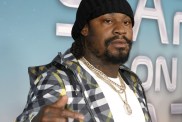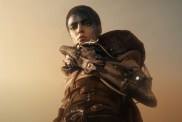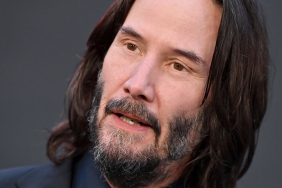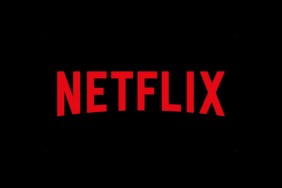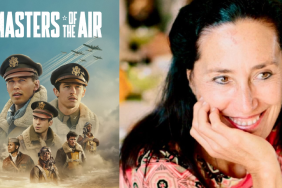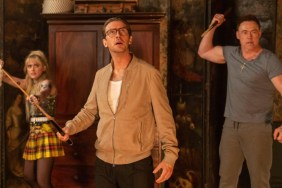After more than a decade in active development under filmmakers the likes of J.J. Abrams and Ron Howard, Stephen King’s epic fantasy series The Dark Tower is finally making its way to the big screen this weekend. Sony Pictures gave ComingSoon.net the opportunity to sit down with the film’s Danish director, co-screenwriter and longtime Dark Tower fan Nikolaj Arcel to discuss how the film changed over the years, which books he took material from, and the upcoming TV show.
RELATED: The Walking Dead’s Glen Mazzara to Showrun The Dark Tower TV Series
ComingSoon.net: The thing I love about the whole concept that King came up with is it’s such a genre mash-up. Is it horror? Is it fantasy adventure? Is it a western? No, it’s all of those, and this movie is all of those, and the characters still feel like the characters.
Arcel: That was also the most important thing for me, because the script was very much like… when I got on board, the script was very much what you see on screen. What I did feel was, “This is definitely different,” but I recognized the characters and recognized their world, so that was good.
CS: I was like, “No, that is definitely Roland.” But I think there probably are going to be a lot of people who, before they see the movie, they’re going to want to try to get into the books, and maybe they’ll read the first book, and then they’re going to come in and they’re going to be so shocked.
Arcel: So confused. (Laughs)

CS: You guys probably cherry picked from across all the books, but what were the main ones that you drew from?
Arcel: You know, Akiva Goldsman is the original screenwriter of this, right? I reworked some of the script, but it’s very much his structure, his idea, his kind of script. So I think that if you ask me, I would say book one and three. Probably a little bit of two, because “The Wastelands” has a lot of Jake thinking he’s crazy and he gets drawn back to Mid-World. There’s the parallel and there’s the journey through Mid-World. There’s a little bit of Man in Black. The Man in Black is obviously also very much a big part of novel one, right?
CS: Sure.
Arcel: The easiest way to explain why we did everything we did is exactly because of the genre mash-up thing you’re talking about. If we were to do a Western now, just a pure Western that kind of is the first novel, and then the second film was like a New York thriller, we also felt that people would probably get confused. “Wait a minute, wasn’t this a Western? So now, this is something different, and now it’s about doors to other worlds.” So we’re trying to build some of these ideas into this first intro film or beginning.
CS: You were trying to do the Whitman’s Sampler of “Dark Tower.”
Arcel: Yeah, we were trying to do the Cliff’s Notes. So I don’t know. We were still very conscious of the fact that — and I think that’s pretty clear, especially because we’ve got more novels than one — this is the beginning. This is the intro to the universe and the characters. It’s not supposed to be, “This is the whole thing.” Like, the eighth novel’s in here. That was never the idea.

CS: Akiva had originally brought in Ron Howard to direct, and they were planning to do a whole sort of transmedia thing with like a series and a movie. And I know you’re planning on doing that as well, but how far along were they when you came on board?
Arcel: They were far. The script was far. Akiva had been working for years on the script, and then other people were working before him. I was allowed to read several iterations of the script and they were very different. Eventually what he landed on with Jeff Pinkner was the script that sort of became the film that you see now. It was a simpler, leaner, tighter, more Jake-centric version of the first part of the little leg of the journey, I guess you would say. I liked that. I dug that. I thought that was cool. As a big “Dark Tower” fan, I always felt it was kind of un-doable. I was always like, “Yeah, nobody’s going to be able to.” But when I read that script, I was like, “Yeah, it’s not exactly, you know, it’s not the first novel, but it makes sense.” And this is a film, you know? It’s a story. It’s a clear story. I understand it. It’s a way in.
CS: And Roland does he have the Horn of Eld in this one?
Arcel: He does.
CS: So this is technically a sequel to the book series?
Arcel: Yeah, yeah. Anyone who isn’t a fan of the novels will know nothing about that.
CS: Sure. So you never made a big deal out of that?
Arcel: Yeah, no.
CS: What would you say are the biggest differences between where Ron Howard was going with the project and where you wound up taking it?
Arcel: One of the big differences is that, well, first of all, I think that Ron Howard’s version was like a $150 million movie, a big epic, you know, holy sh*t. This is like a $60 million, intimate, more lean story. So this is more the first film than I think some of the earlier iterations were. I’ve read scripts that were really encompassing three novels in one film. Even though we steal from a lot of the other works, we are only trying to be kind of novel one in a way.

CS: Sure, because that’s Roland and Jake’s journey.
Arcel: And Walter, those three, right? And it’s not about Eddie or Susannah or any of the other characters yet.
CS: I loved Idris’ role, but part of me misses the hat. I was wondering, what was the thinking behind no hat?
Arcel: Well, he doesn’t have a hat in the novels. He loses his hat in the first novel, and then he doesn’t get it back. But, of course the drawings always show him with a hat. Maybe Stephen King got inspired by that, and by book five, he has a hat again. We were just talking about it’s very cowboy-like. Let’s imagine 10 percent of the people who go see this film are real fans like me, and then there’s the 90 percent who are not. So what do they see? They see, “Oh, that’s a Western.” That’s not really what it is. It is a fantasy saga, right?
CS: Yeah, totally.
Arcel: We actually felt it was a little more easy when I saw the final costume. We did obviously try out a hat, we did try it. Ultimately, we all ended up like saying, “This is more like The Gunslinger.” Maybe he’ll get a hat later.
CS: That’d be good. Maybe because a lot of this takes place on Keystone Earth it would’ve almost become more of like a “Crocodile Dundee” kind of thing if he had the hat.
Arcel: It would’ve been almost a comedy, yeah.
CS: I did notice there was a scene in the village where he’s fighting with somebody and in an overhead shot on a table is the hat. So was that a nod to it?
Arcel: Yeah, there was a hat there, yeah. And we even put a Roland-esque cowboy hat in Walter’s den. You almost can’t see it, but it was a fun little detail. It was like he stole it or something.
CS: King’s famous opening line, “The Man in Black fled across the desert, and the Gunslinger followed,” I read that Stephen King insisted that be in the movie.
Arcel: He always—insisted is such a strong word. It was really like, “It has to start with that,” which meant that he would think it was crazy, and so would I, if the words hadn’t been in there. It’s so iconic. We would’ve been mad not to put it in there.
CS: Was it difficult to find an appropriate place for the voiceover?
Arcel: It became sort of a cryptic, mystical thing in Jake’s dream, which I think is cool, because if we just had written it, “Oh, by the way, and here’s the opening title that says it,” it would’ve been less interesting than actually integrating it into Jake’s dream, which is kind of cool.

CS: Is it the seer, Arra Champignon (Claudia Kim), who’s saying it?
Arcel: Yeah.
CS: You had a smaller budget than like a normal blockbuster to do this. Was the short 95-minute runtime one way to maximize the budget?
Arcel: Oh yeah, for sure. A shorter runtime, not to spend many, many, many days shooting. For me, it was still a huge budget. I’m a Danish filmmaker. The last film I did was $4 million, so $60 million is a lot of money. You’d be surprised how much of that goes to visual effects and stuff like that. But no, I think it was good. It gives you a little more freedom. You can be a little more grounded or mysterious or weird. If you do this $150 million type film, half of it needs to be these huge, crazy battles with robots and dinosaurs, and I didn’t really feel like doing that. So I was happy.
CS: I’m like a huge spaghetti western fan, and most of them, even some of the Sergio Leone ones, are very small, low budget little things with a small cast.
Arcel: Exactly. And the gun fights all build up in one shot, right?
CS: Yeah, so to me, the lower budget felt like an asset. The runtime felt like an asset. I heard that Idris drew more from you and the script than the books.
Arcel: Yeah.
CS: What were the main guidelines for the character that you gave him?
Arcel: For Idris? We were talking about how obviously Roland is a guy who now prefers to be alone in the wilderness, and he’s searching for revenge. And why is that? Because his whole family and all his loved ones have been killed, right? And he’s been in several wars. And so, what was that? I kind of interpreted that, or Idris and I did, as this sort of PTSD war veteran state of being. We talked a lot about that and we researched what it’s like, how war veterans feel, and a lot of people coming home from wars have a tendency to want to be alone. People who have been through some of the worst things have difficulty communicating and being like they used to be before they left. We worked a lot on that. Idris took that to heart. It was also partly his idea. The whole trauma, he played that a lot, or he worked with that a lot. And then, of course, having this kid come into his life and it’s almost like a Disney story, isn’t it? Softening up the soul of the hero, now that I say it out loud. But yeah, we worked a lot on that. So that was the main guideline. And then, being very, very good with guns, also that. (Laughs)
CS: Right. In the book he’s supposed to have an almost supernatural ability with the gun. And if the TV show goes forward, will you be involved in that?
Arcel: I am already, I mean, in the sense that I co-wrote the pilot and the second episode, and we’re figuring out what Season 1 should be. But it’s very, very canonically based on “Wizard and Glass,” number four in the series, and parts of “The Gunslinger,” which you’ve said—
CS: The flashbacks, right?
Arcel: The flashbacks, exactly. So it’s basically Roland’s youth.

CS: That stuff was so well done in the Peter David graphic novels. Are you going to draw a lot from those and from Jae Lee’s illustrations?
Arcel: We do have the rights for them. And Jae Lee just did some really cool posters. So yeah, we have the rights to them. And we have used some of it. And I’m using Robin Furth, who helped Stephen with figuring out “The Dark Tower: A Complete Concordance.” She’s like the one who knows everything about “The Dark Tower.” She was very much a part of the graphic novel. She helped Peter write the stories, and I’ve been working with her a lot. And she’s been a big part of the movie, as well as the TV show. She’s part of the whole team of storytellers, so there’s sort of a symmetry there.
CS: Yeah, that early stuff in Gilead, that is some of the most powerful stuff in the books.
Arcel: Yeah, the meeting.
CS: I think they only added one character for those graphic novels.
Arcel: Yeah, no, really, I really loved that.
CS: So for a final question, can you tell me about the first time you encountered these books? What your experience was the first time you read them?
Arcel: Yeah, I was like 16 or 17 in Denmark. I was already a Stephen King fan by then, but the “Dark Tower” novels hadn’t been translated. So at this point, I actually had to sort of teach myself to read English, complex English, to be able to actually read the new Stephen King novels that were coming out. And “The Gunslinger” was part of it. And I was crazy about it. I bought the audio tape, which he himself had read aloud. He has this great, great Stephen King voice. And I was very into it, man. I even made a little rock album on a cassette tape recorder called “The Gunslinger.” I was just like an uber fan, I was all in.
The Dark Tower opens in theaters tomorrow.

